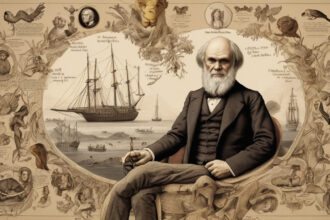“To live is to suffer, to survive is to find some meaning in the suffering.” These timeless words by Friedrich Nietzsche resonate as both a profound philosophical statement and a practical guide for navigating life’s hardships. Nietzsche, one of the most influential philosophers in history, argued that suffering is not just a condition of life but a necessary component of growth, creativity, and self-discovery. His philosophy challenges us to confront life’s inherent chaos and find meaning amidst adversity.
We should consider every day lost on which we have not danced at least once. And we should call every truth false which was not accompanied by at least one laugh.
Friedrich Nietzsche
This article delves into eight key aspects of Nietzsche’s life, philosophy, and legacy, illustrating why his ideas remain relevant and transformative in today’s world.
Nietzsche’s Life: A Journey Through Suffering and Creativity
Friedrich Nietzsche’s life was a testament to his philosophy. Born in 1844 in Röcken, Prussia, Nietzsche’s early years were marked by the death of his father, a Lutheran pastor, when he was just five years old. Raised in a deeply religious household, Nietzsche excelled academically, particularly in classical studies. His intellectual brilliance led to his appointment as a professor of philology at the University of Basel at the age of 24, an extraordinary achievement.

However, Nietzsche’s life was also plagued by chronic health problems, including debilitating migraines and vision issues. These struggles, combined with his growing dissatisfaction with academic life, led him to resign his professorship in 1879. This marked the beginning of a solitary and nomadic existence, during which he produced his most significant works.
Key turning points in his life include:
- Friendship and Break with Richard Wagner (1868):
Nietzsche’s early relationship with the composer Richard Wagner was deeply influential. The two shared a vision for the revitalization of German culture through art. However, Nietzsche later grew disillusioned with Wagner’s nationalism and Christian themes, leading to a dramatic split. - The Creative Burst of the 1880s:
Living in isolation in cities like Genoa and Sils-Maria, Nietzsche experienced a period of unparalleled creativity, producing Thus Spoke Zarathustra, Beyond Good and Evil, and On the Genealogy of Morals. These works crystallized his critiques of religion, morality, and traditional philosophy. - Mental Collapse and Decline (1889):
In 1889, Nietzsche suffered a mental breakdown, reportedly collapsing in the streets of Turin. The exact cause remains debated, with theories ranging from syphilis to a hereditary brain condition. He spent his final years in a vegetative state, cared for by his mother and sister.
Despite his tragic end, Nietzsche’s legacy is defined by the transformative power of his ideas, which continue to inspire thinkers, artists, and individuals seeking meaning in life.
The Philosophy of Suffering: Finding Meaning in Pain
Central to Nietzsche’s philosophy is the acknowledgment that suffering is an inescapable part of life. Rather than viewing pain as a misfortune, Nietzsche argued that it is through struggle and hardship that individuals grow and achieve greatness.
- The Nature of Existence:
Nietzsche rejected the utopian ideal of a life without pain, asserting that struggle and conflict are inherent to existence. For him, suffering is not a curse but a crucible that forges resilience and self-awareness. - Nihilism as Opportunity:
Nietzsche confronted nihilism—the belief that life lacks inherent meaning—head-on. He saw nihilism not as a reason for despair but as an opportunity to create one’s purpose. By embracing life’s challenges, individuals can transcend despair and unlock their potential for greatness.
The Will to Power: Overcoming Through Action
At the heart of Nietzsche’s philosophy lies the concept of the “will to power.” Far from being a mere quest for domination, the will to power is an inner drive to overcome obstacles, assert individuality, and achieve self-mastery.

- Suffering as a Catalyst:
Nietzsche believed that suffering should be embraced as a challenge that strengthens character. The will to power transforms pain into an opportunity for growth and empowerment. - Active Engagement:
Nietzsche encouraged individuals to actively engage with life rather than passively endure it. By confronting adversity with courage and creativity, one can harness the transformative power of the will to power.
The Übermensch: Transcending Conventional Values
One of Nietzsche’s most enduring concepts is the Übermensch, or Overman. This ideal individual transcends societal norms and creates their values, living authentically and creatively in the face of life’s chaos.
The essence of all beautiful art, all great art, is gratitude.
Friedrich Nietzsche
- The Übermensch as an Ideal:
The Übermensch represents humanity’s potential for greatness. This figure does not seek validation from external authorities but derives meaning from their passions and pursuits. - Transforming Suffering into Strength:
The Übermensch does not shy away from suffering but uses it as a tool for self-overcoming and creativity. This concept inspires individuals to rise above societal expectations and embrace their unique potential.
Eternal Recurrence: Living Authentically
Nietzsche’s idea of eternal recurrence is one of his most thought-provoking contributions to philosophy. It challenges individuals to imagine living their life repeatedly, down to the smallest detail, for eternity.
- A Test of Authenticity:
Eternal recurrence asks whether one’s choices and actions are worth repeating infinitely. This perspective encourages individuals to live authentically and embrace both the joys and pains of life. - A Celebration of Life:
Far from being a grim thought experiment, eternal recurrence is a call to affirm life in all its complexity. By living with purpose and intention, one can transcend regret and embrace existence fully.
Major Works of Nietzsche: A Legacy of Thought
Nietzsche’s body of work spans a range of themes, from morality and religion to art and the human condition. His writings are as poetic as they are philosophical, blending vivid imagery with profound insights.
- The Birth of Tragedy (1872):
Explores the interplay between Apollonian (order) and Dionysian (chaos) forces in Greek art. - Human, All Too Human (1878):
A collection of aphorisms examining morality, human nature, and culture. - Thus Spoke Zarathustra (1883–1885):
Nietzsche’s most famous work, introducing the Übermensch and the death of God. - Beyond Good and Evil (1886):
Critiques traditional morality and advocates for life-affirmation and self-determination. - On the Genealogy of Morals (1887):
Investigates the historical origins of moral concepts like guilt and asceticism. - Ecce Homo (1888):
An autobiographical reflection on Nietzsche’s life and philosophy.
Modern Relevance: Lessons for Today’s World
In an era defined by existential anxiety, social instability, and rapid technological change, Nietzsche’s philosophy remains strikingly relevant. His ideas offer practical tools for navigating the complexities of modern life.

- Navigating Uncertainty:
Nietzsche’s recognition of suffering as an inherent aspect of existence encourages acceptance and resilience. - Rejecting Conformity:
His critiques of dogma and mass culture challenge individuals to think independently and create their values. - Personal Growth:
Concepts like the will to power and post-traumatic growth align with contemporary psychological insights, emphasizing the transformative potential of adversity.
Practical Wisdom from Nietzsche: Thriving Despite Suffering
Nietzsche’s philosophy is not just theoretical—it offers actionable lessons for finding meaning and thriving despite life’s challenges.
- Embrace Suffering as a Teacher:
Use pain as a source of wisdom and self-reflection, uncovering deeper truths about yourself. - Create Your Own Values:
Define what matters most to you, free from societal expectations or external validation. - Take Deliberate Action:
Engage actively with life through creative pursuits, personal relationships, and intellectual endeavors. - Focus on Growth Over Perfection:
View struggles as opportunities for improvement rather than failures. - Live Authentically:
Make decisions as if life would repeat infinitely, embracing both its joys and challenges.
Final Thoughts: Nietzsche’s Enduring Legacy
Friedrich Nietzsche’s life and work illuminate the path from suffering to meaning, offering timeless wisdom for those seeking to navigate life’s challenges. His philosophy challenges us to confront pain not as an obstacle but as a necessary ingredient for growth and transformation.
“To live is to suffer, to survive is to find some meaning in the suffering.” Nietzsche’s words remind us that meaning is not handed to us but must be actively created. By embracing life’s hardships with courage, creativity, and resilience, we can unlock our potential for authenticity and greatness.
In a world that often seeks to avoid discomfort, Nietzsche’s insights encourage us to face life’s complexities head-on, transforming pain into purpose and adversity into strength. His legacy endures as a beacon for those who dare to thrive in the face of life’s inevitable challenges.
Additional Resources
Here are the links to the recommended resources for further exploration of Friedrich Nietzsche’s life, philosophy, and legacy:
Books and Biographies
- Nietzsche: Philosopher, Psychologist, Antichrist by Walter Kaufmann
Available on Amazon - Friedrich Nietzsche: A Philosophical Biography by Julian Young
Find it on Barnes & Noble - Nietzsche on Morality by Brian Leiter
Purchase on Cambridge University Press - The Nietzsche Reader edited by Keith Ansell-Pearson and Duncan Large
Explore on Wiley-Blackwell
Online Articles and Encyclopedias
- Stanford Encyclopedia of Philosophy: Friedrich Nietzsche
Explore on Stanford Encyclopedia - BBC History: Friedrich Nietzsche
Visit BBC History - Internet Encyclopedia of Philosophy: Nietzsche
Access on Internet Encyclopedia of Philosophy - Nietzsche’s Will to Power: An Overview by The New York Times
Available on NYTimes.com
Documentaries and Videos
- The Birth of Tragedy: Nietzsche and the Arts
Watch on YouTube - Nietzsche: The Human, All Too Human
Available on Amazon Prime - Friedrich Nietzsche: The Path to the Overman
Stream on CuriosityStream - The Will to Power: A Documentary on Nietzsche
Watch on YouTube
Free Online Texts and Speeches
- The Will to Power
Read on Project Gutenberg - Thus Spoke Zarathustra
Access on Archive.org - Ecce Homo: How One Becomes What One Is
Read on Internet Archive - On the Genealogy of Morals
Available on Project Gutenberg
Academic Articles and Journals
- JSTOR: Nietzsche Studies
Explore on JSTOR - Academia.edu: Nietzsche and Modern Philosophy
Search on Academia.edu - Project MUSE: Nietzsche and the Question of Nihilism
Read on Project MUSE
Cultural and Historical Sites
- Nietzsche’s House in Sils-Maria, Switzerland
Visit the official website - Nietzsche’s Memorial in Röcken, Germany
Learn more on Visit Röcken - The Nietzsche Archive in Weimar, Germany
Find more details on the Nietzsche Archive
These links will take you directly to the materials to dive deeper into Nietzsche’s life and philosophy.
Must Read: Benito Mussolini












